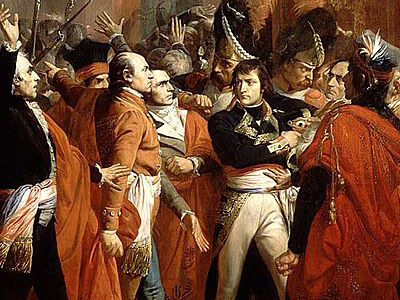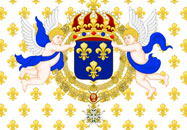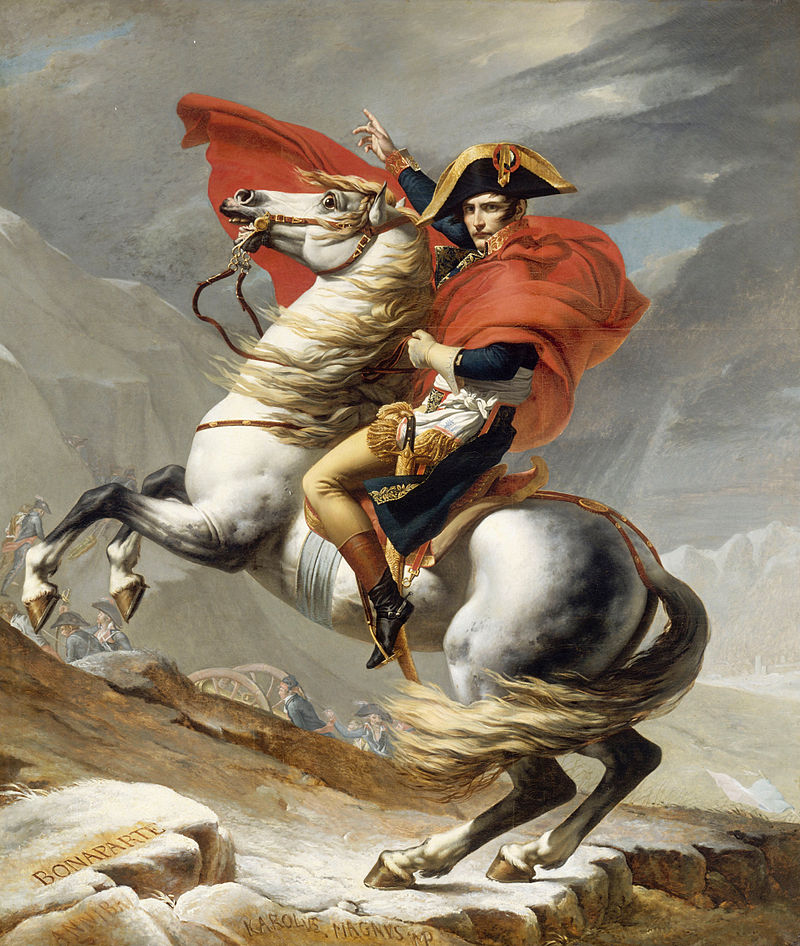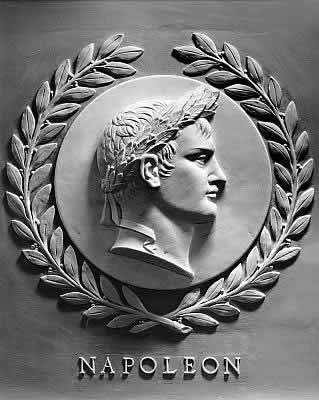Napoleon Bonaparte (1769-1821)
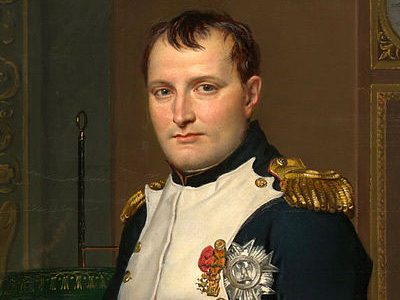
French Consulate
Napoleon established a political system that historian Martyn Lyons called "dictatorship by plebiscite." Worried by the democratic forces unleashed by the Revolution, but unwilling to ignore them entirely, Napoleon resorted to regular electoral consultations with the French people on his road to imperial power. He drafted the Constitution of the Year VIII and secured his own election as First Consul, taking up residence at the Tuileries. The constitution was approved in a rigged plebiscite held the following January, with 99.94 percent officially listed as voting "yes." Napoleon's brother, Lucien, had falsified the returns to show that 3 million people had participated in the plebiscite; the real number was 1.5 million. Political observers at the time assumed the eligible French voting public numbered about 5 million people, so the regime artificially doubled the participation rate to indicate popular enthusiasm for the Consulate. In the first few months of the Consulate, with war in Europe still raging and internal instability still plaguing the country, Napoleon's grip on power remained very tenuous.
In the spring of 1800, Napoleon Napoleon Bonaparte (1769-1821), was a French military and political leader who rose to prominence during the French Revolution and led several successful campaigns during the French Revolutionary Wars. As Napoleon I, he was Emperor of the French from 1804 until 1814, and again in 1815. One of the greatest commanders in history, his wars and campaigns are studied at military schools worldwide. Napoleon Bonaparte » and his troops crossed the Swiss Alps into Italy, aiming to surprise the Austrian armies that had reoccupied the peninsula when Napoleon was still in Egypt. After a difficult crossing over the Alps, the French army entered the plains of Northern Italy virtually unopposed. While one French army approached from the north, the Austrians were busy with another stationed in Genoa, which was besieged by a substantial force. The fierce resistance of this French army, under André Masséna, gave the northern force some time to carry out their operations with little interference. After spending several days looking for each other, the two armies collided at the Battle of Marengo on 14 June. General Melas had a numerical advantage, fielding about 30,000 Austrian soldiers while Napoleon commanded 24,000 French troops. The battle began favorably for the Austrians as their initial attack surprised the French and gradually drove them back. Melas stated that he'd won the battle and retired to his headquarters around 3 pm, leaving his subordinates in charge of pursuing the French. The French lines never broke during their tactical retreat; Napoleon constantly rode out among the troops urging them to stand and fight. Late in the afternoon, a full division under Desaix arrived on the field and reversed the tide of the battle. A series of artillery barrages and cavalry charges decimated the Austrian army, which fled over the Bormida River back to Alessandria, leaving behind 14,000 casualties. The following day, the Austrian army agreed to abandon Northern Italy once more with the Convention of Alessandria, which granted them safe passage to friendly soil in exchange for their fortresses throughout the region.
Napoleon Bonaparte (1769-1821), was a French military and political leader who rose to prominence during the French Revolution and led several successful campaigns during the French Revolutionary Wars. As Napoleon I, he was Emperor of the French from 1804 until 1814, and again in 1815. One of the greatest commanders in history, his wars and campaigns are studied at military schools worldwide. Napoleon Bonaparte » and his troops crossed the Swiss Alps into Italy, aiming to surprise the Austrian armies that had reoccupied the peninsula when Napoleon was still in Egypt. After a difficult crossing over the Alps, the French army entered the plains of Northern Italy virtually unopposed. While one French army approached from the north, the Austrians were busy with another stationed in Genoa, which was besieged by a substantial force. The fierce resistance of this French army, under André Masséna, gave the northern force some time to carry out their operations with little interference. After spending several days looking for each other, the two armies collided at the Battle of Marengo on 14 June. General Melas had a numerical advantage, fielding about 30,000 Austrian soldiers while Napoleon commanded 24,000 French troops. The battle began favorably for the Austrians as their initial attack surprised the French and gradually drove them back. Melas stated that he'd won the battle and retired to his headquarters around 3 pm, leaving his subordinates in charge of pursuing the French. The French lines never broke during their tactical retreat; Napoleon constantly rode out among the troops urging them to stand and fight. Late in the afternoon, a full division under Desaix arrived on the field and reversed the tide of the battle. A series of artillery barrages and cavalry charges decimated the Austrian army, which fled over the Bormida River back to Alessandria, leaving behind 14,000 casualties. The following day, the Austrian army agreed to abandon Northern Italy once more with the Convention of Alessandria, which granted them safe passage to friendly soil in exchange for their fortresses throughout the region.
Although critics have blamed Napoleon for several tactical mistakes preceding the battle, they have also praised his audacity for selecting a risky campaign strategy, choosing to invade the Italian peninsula from the north when the vast majority of French invasions came from the west, near or along the coastline. As Chandler points out, Napoleon spent almost a year getting the Austrians out of Italy in his first campaign; in 1800, it took him only a month to achieve the same goal. German strategist and field marshal Alfred von Schlieffen concluded that "Bonaparte did not annihilate his enemy but eliminated him and rendered him harmless" while "[attaining] the object of the campaign: the conquest of North Italy."
Napoleon's triumph at Marengo secured his political authority and boosted his popularity back home, but it did not lead to an immediate peace. Bonaparte's brother, Joseph, led the complex negotiations in Lunéville and reported that Austria, emboldened by British support, would not acknowledge the new territory that France France, officially the French Republic is transcontinental country predominantly located in Western Europe and spanning overseas regions and territories in the Americas and the Atlantic, Pacific and Indian Oceans. France reached its political and military zenith in the early 19th century under Napoleon Bonaparte, subjugating much of continental Europe and establishing the First French Empire. had acquired. As negotiations became increasingly fractious, Bonaparte gave orders to his general Moreau to strike Austria once more. Moreau and the French swept through Bavaria and scored an overwhelming victory at Hohenlinden in December 1800. As a result, the Austrians capitulated and signed the Treaty of Lunéville in February 1801. The treaty reaffirmed and expanded earlier French gains at Campo Formio. Britain now remained the only nation that was still at war with France.
France, officially the French Republic is transcontinental country predominantly located in Western Europe and spanning overseas regions and territories in the Americas and the Atlantic, Pacific and Indian Oceans. France reached its political and military zenith in the early 19th century under Napoleon Bonaparte, subjugating much of continental Europe and establishing the First French Empire. had acquired. As negotiations became increasingly fractious, Bonaparte gave orders to his general Moreau to strike Austria once more. Moreau and the French swept through Bavaria and scored an overwhelming victory at Hohenlinden in December 1800. As a result, the Austrians capitulated and signed the Treaty of Lunéville in February 1801. The treaty reaffirmed and expanded earlier French gains at Campo Formio. Britain now remained the only nation that was still at war with France.

Bonaparte, First Consul, by Ingres. Posing the hand inside the waistcoat was often used in portraits of rulers to indicate calm and stable leadership
HISTORY

RESOURCES
This article uses material from the Wikipedia article "Napoleon", which is released under the Creative Commons Attribution-Share-Alike License 3.0.
© Stories Preschool. All Rights Reserved.
